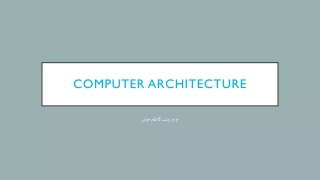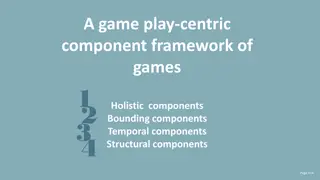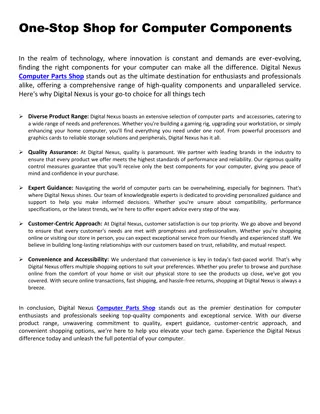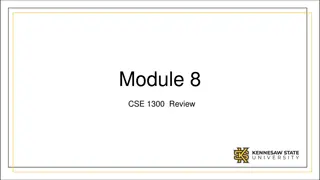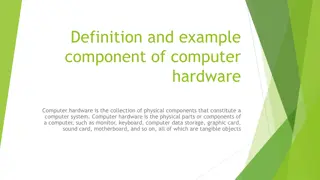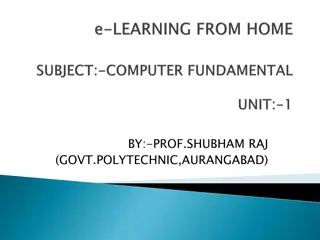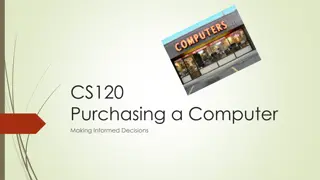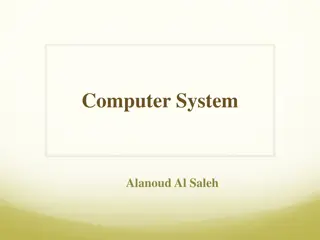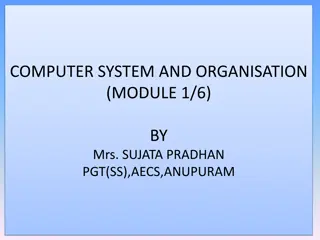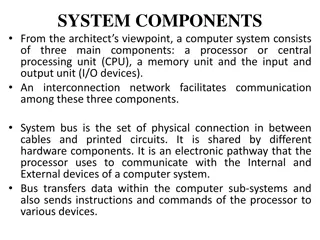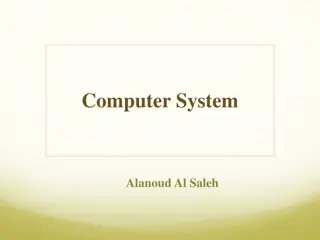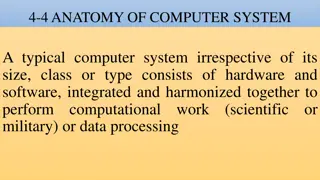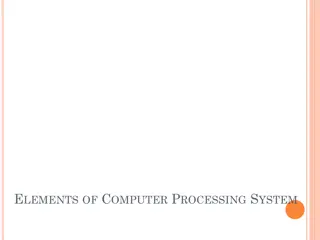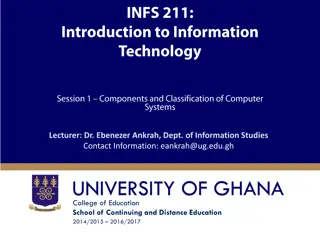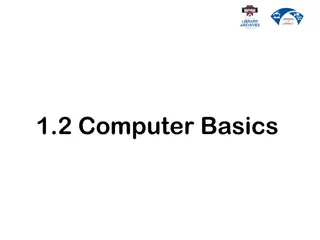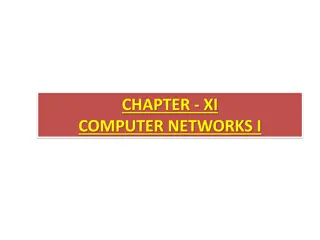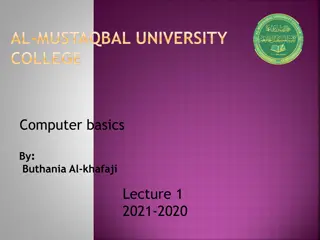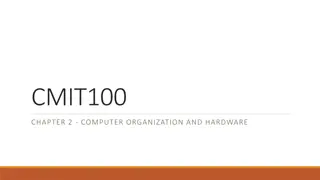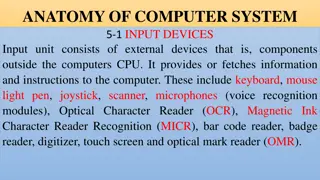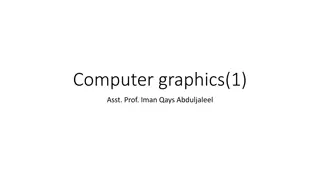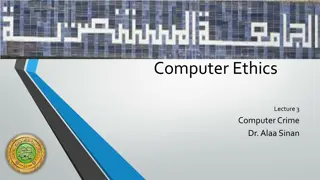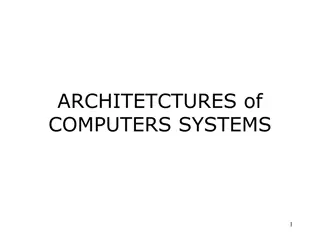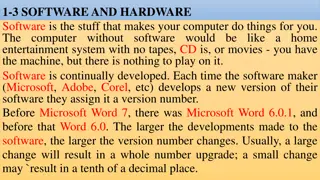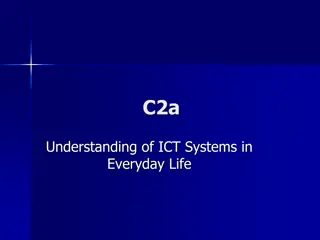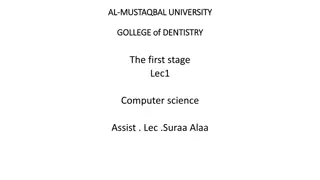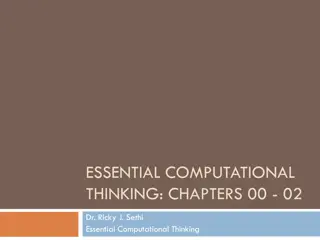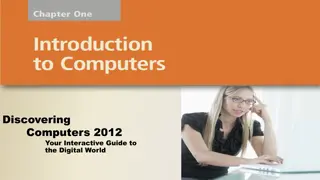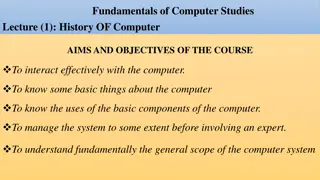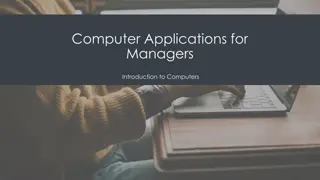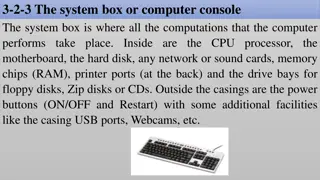Rescue Drone: Increasing Autonomy and Implementing Computer Vision
Focuses on developing a rescue drone with increased autonomy and implementing computer vision for advanced object detection. The team, consisting of Cody Campbell (Hardware Engineer), Alexandra Borgesen (Computer Engineer), Halil Yonter (Team Leader), Shawn Cho (Software Engineer), Peter Burchell (M
78 views • 44 slides
Computer Components and Microprocessor: Understanding Computer Architecture
Explore the main computer components and learn about the operation of these components, including inputting, storing, processing, outputting, and controlling. Understand the role of the microprocessor in computer processing and its characteristics such as instruction set, bandwidth, and clock speed.
11 views • 20 slides
Understanding Computer Organization and Architecture
A computer system is a programmable digital electronics device that processes data as per program instructions to provide meaningful output. It comprises hardware and software components, with hardware being the physical parts and software essential for driving the hardware. Computer organization fo
14 views • 71 slides
Introduction to Components of a Computer System in Home Science
Explore the components of a computer system in Home Science, including input devices like the keyboard, alphanumeric keypads, cursor movement keys, and special keys such as Enter, Ctrl, Esc, and more. Learn about the internal structure of a computer system and the key functions of CPU, ALU, memory,
8 views • 12 slides
Exploring Holistic Components in Game Design Frameworks
This content delves into a game play-centric component framework that encompasses various elements such as holistic components, bounding components, temporal components, and structural components. It discusses the setup and execution of game sessions, different modes of play, player goals, events, a
6 views • 22 slides
One-Stop Shop for Computer Components
Buy retailer price and all latest desktop component prices in Bangladesh at computer village buy your desire computer parts price in Bangladesh see all computer accessories price casing, ram, graphic card, hard disk, SSD, cooling fan, etc\n
10 views • 1 slides
Understanding Computer Components and Binary Numbers in Computing
Computer components like the case, power supply unit, motherboard, and storage devices play crucial roles in a computer system. CPUs consist of essential parts like the ALU, control unit, and registers. Binary numbers, a base-2 numbering system, simplify data representation and processing in computi
1 views • 44 slides
Overview of Computer Hardware Components and Software Functions
Computer hardware components such as monitor, CPU, mouse, and projector are essential physical parts of a computer system, while software includes intangible programs like operating systems and utility software. Hardware components perform tasks like displaying data, processing information, and prin
8 views • 9 slides
Understanding the Basics of Computer and Its Components
A computer is an electronic device that processes data input by the user to provide output results. It comprises components like ALU, CU, and MU, each with specific functions. The CPU acts as the brain of the computer, transforming raw data into information. The system's memory units, RAM and ROM, s
2 views • 12 slides
Understanding Computer Hardware and Software
Computer hardware comprises the physical components like CPU, monitor, keyboard, mouse, printer, and more, while software consists of system software and application software. Learn about the different components and their functions in this introductory guide to computer systems.
0 views • 17 slides
Essential Guide to Computer Purchasing Decisions
Learn about different computer types, hardware options, necessary features, and internal components to make informed decisions when purchasing a computer. Explore the differences between desktops, laptops, tablets, smartphones, and more, along with a breakdown of input and output options, processing
2 views • 11 slides
Understanding Computer Systems: Components and Organization
Computer systems are high-speed electronic machines that process data and instructions through hardware and software components. The elements include hardware, software, and users, with binary systems using bits and bytes to represent data. The organization of a computer involves input, CPU, memory,
2 views • 21 slides
Understanding Computer Architecture and Organization
Computer architecture and organization are fundamental aspects of computing systems. Computer architecture focuses on the functional design and implementation of various computer parts, while computer organization deals with how operational attributes come together to realize the architectural speci
3 views • 40 slides
Understanding Computer System and Organization
Computer Organization involves the logical structure of a computer, defining the interconnections of components for optimal performance. Computers process data through an Input-Process-Output cycle, with input, processing, and output units working together. The characteristics of a computer include
1 views • 20 slides
Understanding Computer System Buses: Components and Functions
A computer system comprises three main components - the CPU, memory unit, and I/O devices connected via an interconnection network, facilitated by the system bus. System buses reduce communication pathways, enabling high-speed data transfer and synchronization between components. Internal buses conn
3 views • 55 slides
Computer Science Department Information and Courses Offered
The Computer Science Department provides information on courses offered for GCSE or BTEC qualifications, specifically focusing on the AQA GCSE in Computer Science. The course equips students with valuable thinking and programming skills essential in the modern workplace, covering key concepts and pr
3 views • 7 slides
Understanding Computer Systems and Components
Computer systems are high-speed electronic machines that process data and instructions to solve problems. They consist of hardware and software elements, with input and output devices for interaction. Key concepts include binary system, byte measurement units, hardware organization, and input hardwa
1 views • 21 slides
Anatomy of a Computer System: Hardware Components and Functions
A typical computer system consists of hardware and software working together to perform various computational tasks. The hardware components include the central processing unit (CPU), input/output devices, storage units, and the motherboard. The CPU acts as the main brain of the computer, performing
6 views • 6 slides
Understanding Computer Hardware Components
Computer hardware encompasses the physical components of a computer system that can be touched and felt, such as the motherboard, CPU, RAM, and storage devices like HDD and SSD. Without hardware, essential software cannot run efficiently. This lesson explores the definition, importance, and various
1 views • 6 slides
Understanding Computer Processing Systems
Computer processing systems consist of various components such as the control unit, ALU, input unit, CPU, output unit, memory, and more. Input devices feed raw data to the computer, while output devices provide processed information. The CPU plays a crucial role in executing instructions and data pr
0 views • 13 slides
Introduction to Computer Systems: Components, Types, and Functions
This session conducted by Dr. Ebenezer Ankrah covers the essential aspects of computer systems, including hardware components, types of computer systems, and information systems. Students will gain an understanding of the fundamental principles and characteristics of computer systems, enabling them
0 views • 41 slides
Understanding Computer Basics for Beginners
Explore the fundamental concepts of computer technology, from the importance of computers to the distinction between hardware and software. Discover how computers function, the role of operating systems, and the significance of learning computer skills. Uncover the essential components of a computer
1 views • 36 slides
**Exploring Inquiry-Based Learning in Computer Science Education**
Inquiry-based learning (IBL) in computer science classrooms focuses on fostering communication, collaboration, decision-making, and problem-solving skills among students. The approach involves students constructing knowledge through independent, active activities based on real-world experiences. How
0 views • 18 slides
Understanding Computer Networks: Advantages, Disadvantages, and Components
Explore the world of computer networks with this comprehensive guide covering the definition, benefits, drawbacks, and key components of networking systems. Discover how computer networks facilitate communication, resource sharing, and flexibility while also facing challenges such as security risks
0 views • 115 slides
Evolution of Algorithms and Computer Science Through History
The history of algorithms and algorithmic thinking dates back to ancient times, with the development of general-purpose computational machines by Charles Babbage in the 19th century marking a significant advancement. The term "computer science" emerged in 1959, encompassing theoretical computer scie
1 views • 39 slides
Understanding Computer Basics: Hardware, Software, and Components
A comprehensive overview of computer basics covering hardware components like processors, memory, storage, input and output devices, as well as software components such as operating systems and applications. Learn about the role of supercomputers, mainframes, and personal computers, and understand t
0 views • 12 slides
Understanding Computer Organization and Hardware Components
Explore the components of a computer system, from the CPU to storage devices, and learn about the IPOS cycle, memory hierarchy, and input/output devices. Discover the importance of assembling a computer from individual parts and the impact of I/O devices on human-computer interaction.
0 views • 13 slides
Overview of Computer Input and Output Devices
Input devices of a computer system consist of external components like keyboard, mouse, light pen, joystick, scanner, microphone, and more, that provide information and instructions to the computer. On the other hand, output devices transfer information from the computer's CPU to the user through de
0 views • 11 slides
Understanding Computer Graphics: An Overview
Computer graphics involves creating images and animations using a computer through hardware and software systems. It has evolved significantly over the years, with advancements in generating various types of computer graphics. Learn about the basics of computer graphics, including digital image repr
0 views • 15 slides
Understanding Computer Crimes and Prevention Strategies
Computer crimes involve illegal acts utilizing computer systems, leading to various consequences. This lecture covers the types of computer system attacks, motives behind computer crimes, costs, prevention strategies, and reflection on the discussed topics. It emphasizes the increasing scope of comp
1 views • 20 slides
Understanding Computer Hardware Components
Computer hardware refers to the physical components of a computer system that you can see and touch. This includes the system unit, which contains components such as the CPU (Central Processing Unit), motherboard, RAM (Random Access Memory), power supply, expansion cards, and modem. Understanding th
0 views • 22 slides
Understanding Computer Systems Architectures and Standards
Open systems, standards, client-server models, and internet functionality are crucial components of computer systems architectures. Open systems promote interoperability, standards ensure technical criteria, client-server models define coordination, and the internet provides a communication infrastr
0 views • 34 slides
Basics of Software, Hardware, and Computer Components
Software enables a computer to function, while hardware comprises its physical components. Learn about the difference between software and hardware, key computer parts like monitor, CPU, and keyboard, as well as their respective roles. Additionally, explore the significance of different technologies
0 views • 7 slides
Understanding ICT Systems in Everyday Life
Explore the basic components of a computer system, including the processor, internal memory, input/output devices, and storage, with a focus on how computer systems function in daily life. Learn about computer monitors, the role of operating systems, RAM and ROM memory types, cache memory, and how c
0 views • 130 slides
Overview of Computer Science at Al Mustaqbal University College of Dentistry
Al Mustaqbal University College of Dentistry offers courses in computer science, covering topics like data reception, processing, storage, and output. The curriculum includes the study of computers as electronic devices, data and information, computer features, operating systems like Windows, and ta
0 views • 10 slides
Understanding the Essence of Computer Science and Computational Thinking
Delve into the fundamentals of Computer Science and Computational Thinking through chapters discussing the nature of science, predictions in physics, and the distinction between Computer Science and Computer Information Systems. Explore the relationships between Math, Physics, and Computer Science i
0 views • 29 slides
Introduction to Discovering Computers: Your Interactive Guide to the Digital World
Delve into the world of computers with "Discovering Computers 2012," exploring basic concepts such as the definition of a computer, its components, importance of computer literacy, and the role of computers in various sectors. Discover the distinctions between system and application software, types
0 views • 38 slides
Fundamentals of Computer Studies: Understanding the Evolution and Importance of Computers
Computer studies cover the history, aims, and objectives of computers, emphasizing their vital role in today's world. The course explores basic computer components, data processing, and the transformation of manual tasks to automated processes. Computers are indispensable tools for efficiency and pr
0 views • 13 slides
Understanding Computer Applications for Managers
This educational material introduces computer applications specifically tailored for managers, covering basic functions, operating systems, program navigation, file management, and more. It delves into essential computer concepts, hardware components, software systems, security measures, efficiency
0 views • 39 slides
Understanding Computer Input Devices and Keystrokes
The system box of a computer contains essential components like the CPU, motherboard, and memory chips. Character keys, action keys, and application-dependent keys on a keyboard serve different functions, from typing letters to performing actions. Key combinations and shortcuts provide efficient way
0 views • 10 slides

